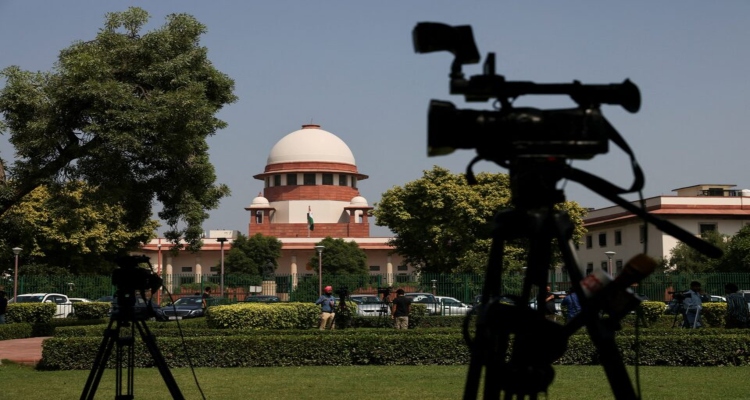
The Supreme Court on Wednesday stayed a controversial order by the Allahabad High Court, which had ruled that acts such as grabbing a child’s breasts, breaking the string of her pyjama, and attempting to drag her beneath a culvert do not amount to rape or attempted rape.
The stay order was passed by a bench comprising Justices BR Gavai and Augustine George Masih in a suo motu case initiated by the Supreme Court. The case was taken up after the judgment was brought to the court’s attention by the organization “We the Women of India.”
Court Orders
The court criticized the High Court’s ruling, stating that it lacked sensitivity and was not a decision made in haste. The bench noted that the judgment was delivered four months after it was reserved, indicating that there was sufficient time for deliberation.
“We are at pains to state that it shows a total lack of sensitivity on the part of the judge who authored the judgment,” the bench observed. “The order was not given in the spur of the moment; it was delivered after four months. Therefore, there was an application of mind.”
Considering the gravity of the issue, the apex court decided to stay the observations made in paragraphs 21, 24, and 26 of the High Court order. Solicitor General (SG) Tushar Mehta supported the court’s decision, stating that the ruling contained enough reasons to justify the stay.
Court’s Disapproval
Justice Gavai expressed disappointment over the High Court’s approach, calling it a “serious matter” and emphasizing the “total insensitivity on the part of the judge.” The Solicitor General concurred, adding that the Chief Justice of the Allahabad High Court should take necessary steps regarding such judgments.
The Supreme Court has now sought responses from the Central Government and the Uttar Pradesh Government and requested assistance from Attorney General R. Venkataramani and Solicitor General Tushar Mehta in the case.
“We issue notice to the Union Government, State of Uttar Pradesh, and parties involved before the High Court. The learned Attorney General and Solicitor General shall assist the court,” the Supreme Court ordered.
Additionally, an appeal filed by the mother of the child victim challenging the High Court order has been clubbed with the suo motu case for a joint hearing.
Case Background
The Allahabad High Court issued the controversial ruling on March 17, 2025, while modifying a summoning order against two accused, Pawan and Akash. Initially, the trial court had summoned them under Section 376 of the IPC (Rape) and Section 18 of the POCSO Act (Attempt to Commit Offense).
However, the High Court downgraded the charges, directing that they be tried under Section 354-B of the IPC (Assault with Intent to Disrobe) and Sections 9/10 of the POCSO Act (Aggravated Sexual Assault).
While doing so, Justice Ram Manohar Narayan Mishra stated that merely grabbing the victim’s breasts and attempting to pull down her garment did not indicate a determined intent to commit rape. The court further observed that there was no evidence suggesting that the accused had attempted penetrative sexual assault.
Stand on the Case
According to the prosecution, the accused grabbed the breasts of an 11-year-old girl, broke the string of her pyjama, and attempted to drag her beneath a culvert. However, before they could proceed further, passers-by intervened, forcing the accused to flee.
The trial court considered this a case of attempted rape and invoked Section 376 and Section 18 of the POCSO Act, issuing a summoning order under these provisions.
However, the accused challenged the order before the High Court, arguing that even if the allegations were accepted as true, it did not constitute rape or attempted rape. They contended that, at most, the case fell under Sections 354 (Assault with Intent to Outrage Modesty of a Woman) and 354-B IPC (Assault with Intent to Disrobe), along with relevant POCSO provisions.
Downgrading Charges
The Allahabad High Court accepted this argument and ruled that the acts of touching, breaking the pyjama string, and attempting to drag the victim were not sufficient to establish an intent to commit rape. It reasoned that:
There was no evidence that the accused had a determined intent to commit rape. Witnesses did not state that the accused’s actions had fully undressed the victim.
There was no allegation that the accused attempted penetrative assault.
Based on these findings, the High Court ruled that the case did not meet the legal criteria for attempted rape, leading to the modification of the charges.
Following the strong objections raised by women’s rights organizations and legal experts, the Supreme Court stepped in to examine the issue.
The case will now be heard further after receiving responses from the Central and Uttar Pradesh governments. The Supreme Court’s stay on the High Court’s observations ensures that the matter remains under review, signaling a zero-tolerance approach towards insensitive judicial pronouncements in cases involving child sexual abuse and gender-based violence.
Read More: Supreme Court, Delhi High Court, States High Court, International




